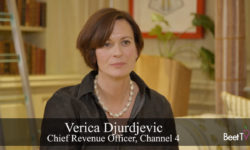LONDON, UK — It is the UK’s main commercial free-to-air broadcaster, with a solid heritage in linear mass-market viewing, and once struggled to make headway online.
Now, with the relaunch of its online viewing platform and expansion in its TV ad targeting capabilities, ITV is offering a litany of digital-style capabilities.
Given ITV’s massive scale, that could mean UK viewers and advertisers alike are about to cross a new threshold in connected TV’s maturation.
In this video interview at Beet.TV’s London summit in December, Kate Waters, Director of Client Strategy & Planning, ITV, explained what is going on.
ITVX marks the spot
On December 8, ITV relaunched ITV Hub, its own cross-platform “BVOD” (broadcaster-VOD) service, as ITVX.
The relaunch doesn’t just give ITVX a more appealing modern interface. It also threads archive shows into a series of new “live” channels, alongside its core live-linear simulcasts and ongoing VOD. In other words, ITVX sees ITV emerging beyond VOD, becoming a “FAST” (Free, Ad-Supported TV) player, in the modern parlance.
It also brings a commitment to invest £180 million in new programming specifically for the platform.
All that means a new canvas for advertisers to reach its 36 million users, in a country whose population is 67.3 million.
It’s coming ?
⁰ITVX, the UK’s freshest streaming service, launches on 8th December. Access over 10,000 hours of free content with new and exclusive titles dropping each week. #ITVX pic.twitter.com/Ksv4W38LDX— ITVX (@ITVX) November 7, 2022
Retail media odyssey
Those new capabilities are offered through Planet V, ITV’s demand-side platform allowing media-buying agencies into the offering.
It includes demographic targeting, one-to-one matching through InfoSum’s clean room and more. ITV is even working with the Tesco supermarket and Boots pharmacy chain to support targeted ads based on their loyalty card data.
“We think that retail media is the new thing and it’s growing really fast,” Waters says.
“So we’re incredibly excited that now we have that capability that will mean, for example, if you are Fever Tree, who make, premium tonic water, that you can now target gin buyers in Tesco. Or, if you’re launching a new lipstick, for example, then you can target heavy consumers of cosmetics through Boots.”
ACR for ITV
It doesn’t stop there.
ITV also plans to use automated content recognition (ACR) to help advertisers target ads against viewers who are eating.
“If you want to target, for example, moments where people are eating, not just shows that are about food, it will look at all of the ITV content and it will pass that and basically build you a schedule that’s based on that context,” Waters says.
Toward outcomes
ITV is even working on closing the loop, partnering with tech vendors like Adalyser and ViewersLogic on pilots to test measuring true outcomes of the ads it sells.
“We’re looking at a whole range of brand uplift partners. We’re looking at digital intermediate metrics,” Waters says.
“We’re exploring the way in which TV drives auction performance. We’re also looking at search queries, at website traffic. We’re also going to try and do some work to look at business outcomes as well.”
Waters says it is an “ambitious and exciting” way of trying to prove the effectiveness of TV.
Beyond Planet V
For a broadcaster whose historic use by ad buyers has been mass-market linear reach (ITV broadcasts shows like The X-Factor and I’m A Celebrity, Get Me Out Of Here), the line-up isn’t just a culture shift, it all could add up to a big leg-up for connected TV ad targeting in the UK.
But Waters doesn’t want to stop at the benefits being enjoyed by ITV alone.
“Certainly, the ambition for Planet V is that it will hold not just ITV inventory, but also inventory from other broadcasters in the UK as well,” she says.
“It should become, we hope, the place to buy for anybody who’s looking for a TV campaign.”
Ad buyers in the UK, like elsewhere, have been searching for consolidation in the routes to buy addressable and connected TV services.
Outside of ITV, the other main broadcaster inventory pool consists of an alliance between Channel 4 and Sky.
AVOD rising
ITVX’s attempt at recasting ITV as an AVOD/FAST operator is timely, coming as the subscription streaming market is seen as slowing down.
“Now that people like Netflix have obviously introduced an ad funded tier, our belief is probably what you’ll see as people possibly downgrading from their more expensive subscriptions to the ad funded one,” Waters told me.
“We think actually that the market for ad funded streaming is going to be really good and the economy may help us in that regard.”
You’re watching “Looking Ahead: TV in Europe 2025” a Beet.TV Leadership Summit presented by Magnite & Publica, in partnership with egta. All videos were filmed on-site at our event at London’s Soho Hotel. For more videos from this series, please visit this page.











































